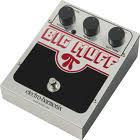For decades, it's been a general opinion that tube (or valve) amplifiers sound better than solid state amps.
First of all - what is a tube amp? A tube amp is a type of guitar amplifier that operates on valves (or vacuum tubes) instead of transistors. The sound you get from a tube amp is warmer and fuller that what you'd get from a solid state amp.
Valve amplifiers range from a few hundred dollars to a few thousand dollars, so the choice is really confusing! If you're reading this article, you've probably decided that it's time that you want to crank your volume past the 10 mark on your current practice amp or the tone just isn't satisfying you anymore.
There are a few things you have to know in order to make your decision. First of all, the type of music that you play, so that you can decide on the amount of gain that your amp needs to have. What is gain? Gain is basically a synonym for distortion. If you play mostly "clean" music (virtually, no amount of distortion), you won't need a lot of gain. If the music you play is blues or rock, you'll need a mild amount of gain, depending on how distorted you want the sound to be. If you play metal, you'll need a high-gain tube amp.
The most notable clean amp of all tube amp history is the Fender Bassman, the holy-grail of clean sounds. Generally, you'll want to look at Fender and Vox. Most tube amps have the amount of gain necessary for blues or rock (Marshalls, the expensive Buddas, the budget Blackhearts). Finally, if we're talking metal, you're going to want to look at Peavey, Mesa Boogie, ENGL.
The second aspect of a tube amp, why many people crave them, is the dynamic. Dynamic is the ability of the tube amp to sound clean when you're hitting the strings softly, and distorted when you're hitting them hard. This allows a great amount of expression. You're going to have to listen to an amp to see if it has this quality.
You'll also have to listen for definition, which is the ability to amplify every single note your play clearly. This is very important, otherwise you'll sound all muddy. The best way to test this is to play some chords, even fewer amps possess this quality.
Lastly, you'll just have to listen if it possesses the basic tonal characteristics that fit you. If the basic sound of the amp is bad, it will sound bad anyway you will adjust the equalizer, amount of gain, anything. It's not uncommon that you find bad tube amps made by prestigious brands. There's no such thing as "not knowing" if it sounds good or not, and although store employees can help you with various information such as amounts of gain, number of tubes, etc. they always want to convince you to buy the products you're trying. If you don't buy it, you can always come back another time and try it again, but if you do, you'll just lack motivation and it will harm your playing. This is important because tube amps aren't as cheap as a practice amp. Always try before you buy!
My name is Andrei Popa, and I've been playing electric guitar for 6 years now. I've bought and sold a lot of gear over the years, filtered all the guitar playing information I've received and have generally been through a lot of trial and error. I maintain a gear reviews website at http://guitar-gear-demos.blogspot.com
Article Source: http://EzineArticles.com/?expert=Andrei_Popa

No comments:
Post a Comment